September 24, 2020 - No. 64
Militant
Canada-Wide Actions in Defence of Migrant Rights
Permanent
Status for All Now! 
Montreal, September 20, 2020
•
Statement of Migrant Rights Network
• Review of
Actions in Brief
In
Action to Defend Their Rights
• BC Hospitality Workers
Continue to Fight for Job Security
• Striking Ledcor Workers' "Drive for Dignity"
• Ten Thousand
Quebec Home Daycare Workers on Strike
Militant
Canada-Wide Actions in Defence of Migrant Rights
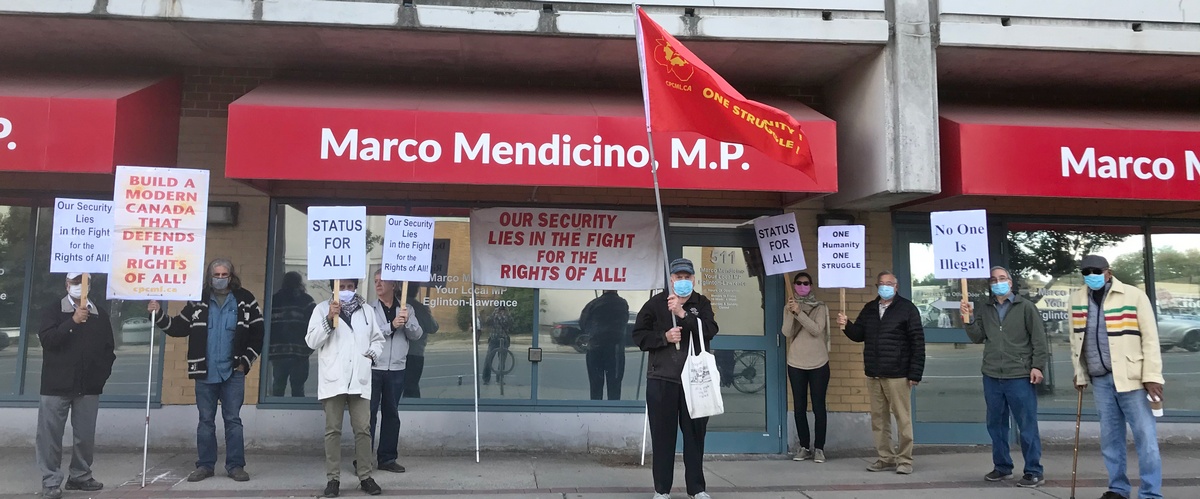
Picket outside the Toronto constituency office of the Minister of Immigration Marco
Mendicino,
September 20, 2020.
Actions were held across Canada
on September 18, 19 and 20 to press the demand for Status For All!
There were marches, rallies, pickets (in front of the constituency
offices of the Prime Minister in Montreal and the Minister of
Immigration in Toronto, as well as other MPs), online rallies and banner drops in many
cities, including St. John's, Halifax,
Charlottetown, Fredericton, Montreal, Toronto, Hamilton, Kitchener, St.
Catharines, Sudbury, Winnipeg, Kelowna and
Vancouver. 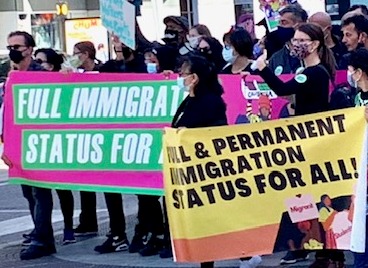 These actions,
along with an open letter issued by the Migrant Rights Network and
supported by more than 300 organizations, came just ahead of the
reconvening of Parliament on September 23. Status for All! means that
the federal government must put an end to categorizing and
discriminating against people seeking to establish status in
Canada. No One Is Illegal. Status is necessary for one and all --
migrant workers, undocumented workers, refugee claimants and
international students -- to access health care and education, for
family reunification, to ensure basic protections and services. These actions,
along with an open letter issued by the Migrant Rights Network and
supported by more than 300 organizations, came just ahead of the
reconvening of Parliament on September 23. Status for All! means that
the federal government must put an end to categorizing and
discriminating against people seeking to establish status in
Canada. No One Is Illegal. Status is necessary for one and all --
migrant workers, undocumented workers, refugee claimants and
international students -- to access health care and education, for
family reunification, to ensure basic protections and services.
Migrant workers are essential workers, part of the Canadian
working class. They are the mainstay in some sectors including
agriculture, food processing, seniors' care and child care, the
hospitality industry, academic research, etc., yet a myriad of
barriers are erected to block them from achieving permanent resident
status and citizenship. It
is a matter of principle that if people are good enough to work or to
study in Canada they are good enough to have full status. The
ruling circles, their political representatives, mass media and others
talk a lot about "building back better" from the pandemic and how the
changing
international situation requires Canada to champion human rights. The
image presented is laughable. Canada lectures Venezuela, China
and others about "human rights abuses," interferes in the internal
affairs of others, supports dictatorial regimes like that of Duterte in
the Philippines, arms the Saudi regime to suppress its own people and
wage war on Yemen, while the Indigenous peoples, temporary foreign
workers and immigrants, refugees and other sections of the working
class are denied basic rights. Holding governments to account is an
issue for all Canadians. First and foremost, it means using one's own
voice and taking a stand in defence of the rights of all. Status for
All! is one such demand. Accountability begins at home! 
This past weekend, just days before politicians return to
Parliament, a single message echoed from St. John's to Vancouver and
Montreal to Sudbury; from migrant workers, refugees, undocumented
people, international students and allies: we demand full and permanent
immigration status for all now. 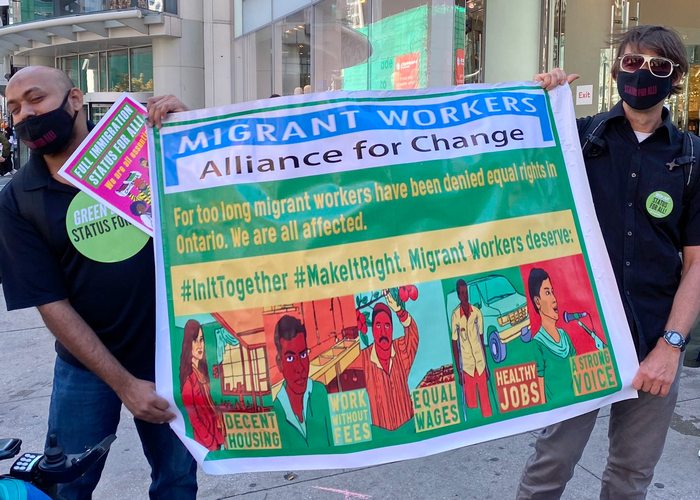 This Wednesday [September 23],
the Trudeau government will announce its priorities and its plan for
the new session of Parliament. Opposition parties will have to decide
where they stand and who they are willing to fight for. We have no time
to lose. We need you to help us get louder! This Wednesday [September 23],
the Trudeau government will announce its priorities and its plan for
the new session of Parliament. Opposition parties will have to decide
where they stand and who they are willing to fight for. We have no time
to lose. We need you to help us get louder!
Take
action by calling on PM Trudeau to ensure Status for All. We
have seen how the economic and social crisis that came to a head with
COVID-19 has forced millions into deeper poverty and economic
exploitation, while leaving the richest few unscathed. There
can be no recovery without undoing the economic, political, and social
systems that produced these inequalities. And that means a full
overhaul of an immigration system that has tipped the scales against
racialized migrants for so long. A fair society, a just society, means
full immigration status now. But no matter what
happens this week, we will keep organizing for justice. Each of us has
a role to play. We must bring more people into the movement because it
is only together that we will win. 
Vancouver and Kelowna  Vancouver, September 18, 2020 Vancouver, September 18, 2020
On Friday, September 18, organizations
of migrant workers and their supporters in Vancouver and Kelowna
carried out actions calling for "Full and Permanent Immigration Status
For All" as part of the cross Canada campaign, taking a bold stand in
defence of the rights of all. Radical Action with
Migrants in Agriculture (RAMA) dropped banners over the railings of the
Highway 97 pedestrian overpass in Kelowna during rush hour on
September 18. 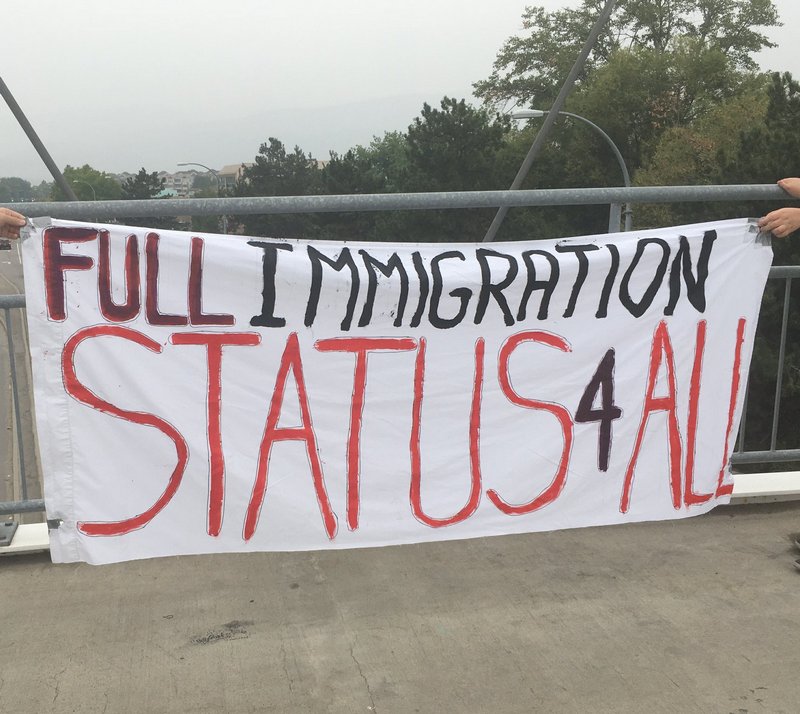
Kelowna
banner drop, September 18, 2020 in preparation for Day of Action. |
Spokesperson
Robyn Bunn told iNFOnews "All temporary foreign workers deserve status
upon arrival [in Canada] in recognition that they are not temporary and
are not foreign... temporary status prevents them from accessing their
rights and benefits and also is part of the reason conditions on farms
are, sometimes, exploitive and abusive
because they can be seen as temporary and expendable." RAMA
works extensively with migrant farm workers who are brought to Canada
through a program that provides them visas that only allow them to stay
a maximum of eight months in Canada and only work for one employer.
To
call them "temporary" when many have
worked in the Okanagan for up to 20 years, is to misrepresent their
contribution and significance to the agricultural sector. Bunn also
made the point that one cannot really call them "foreign" because many
live and work in Canada longer each year than they do in their home
countries. Most of the migrant agricultural workers in British Columbia
come from Mexico. A fraction of the 4,500 migrant
farm workers who come to BC annually get sponsored for citizenship. The
rest are sent home. If they were given permanent immigration status
Bunn says this "would mean visas don't have an end date. It means they
are treated as permanent residents in all senses, meaning they get
health care, they get access to
benefits and all those kinds of things that permanent residents get.
They can bring their families and they can become part of our
community, if they choose to do that." In Vancouver, on September 18,
a banner calling for "Full Immigration Status for All" was displayed at the
Broadway-City Hall SkyTrain Station at 7:30 am to meet morning
commuters. Copies of Workers' Forum articles demanding permanent status
for all and the Open Letter to the Federal Government from Migrant
Rights Network were distributed. 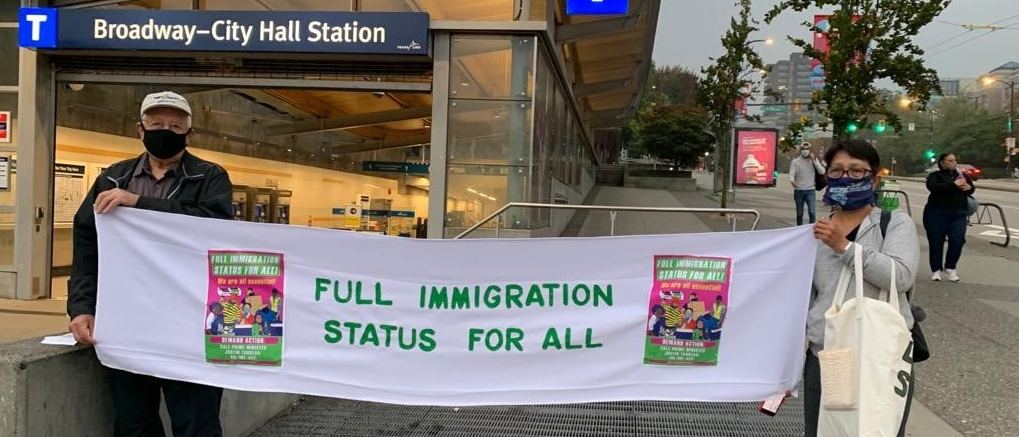
Vancouver, September 18,
2020
At another busy
traffic location near the Venables viaduct and Main Street, Sanctuary
Health held up a huge banner supported by eight people greeting the
morning commuters, many of whom honked their horns in support.
This was a vigorous preparation for the September 20 national
day of action whose focus once again was that Canada must uphold the
rights of all migrants to Canada and grant status immediately to the
1.6 million people living here without permanent resident status.
Permanent resident status must be recognized so that all migrants have
the
basis for a dignified and secure life. As the call out for the previous
cross Canada day of action said: "For too long,
those of us without permanent resident status have been unable to get
universal services or speak back against bad bosses and power
structures. COVID-19 has exacerbated our crisis. We have lost lives and
livelihoods. We have been excluded from receiving the support we need.
We need a single-tier society where everyone in
the country has the same rights and opportunities, and that means full
and permanent immigration status for all. No more racism, no more
deaths, no more exploitation, Status Now!" Sudbury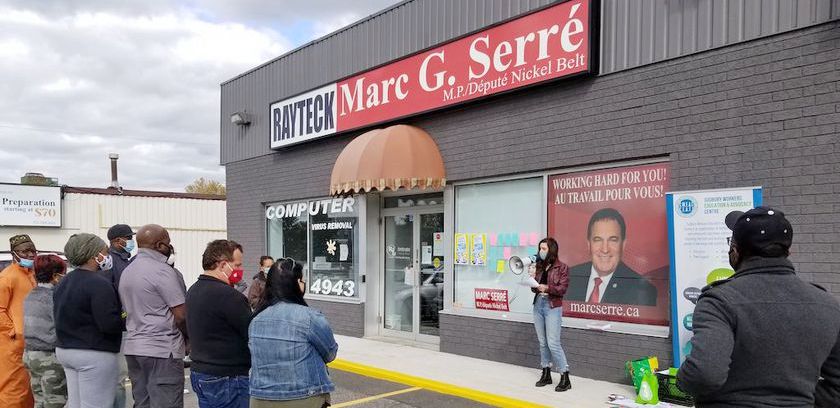
St. Catharines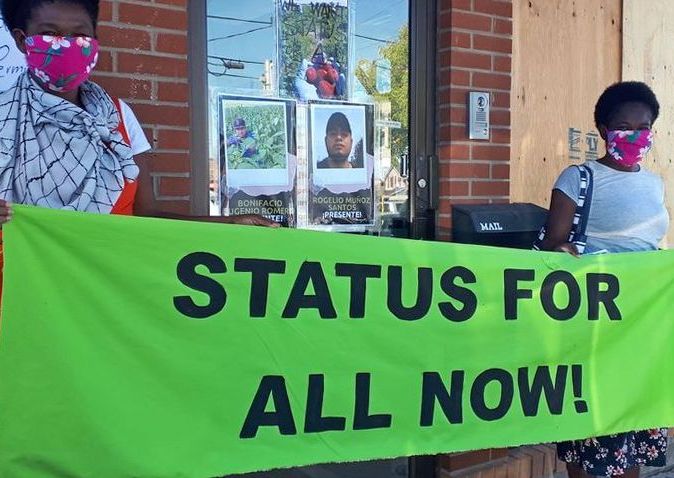 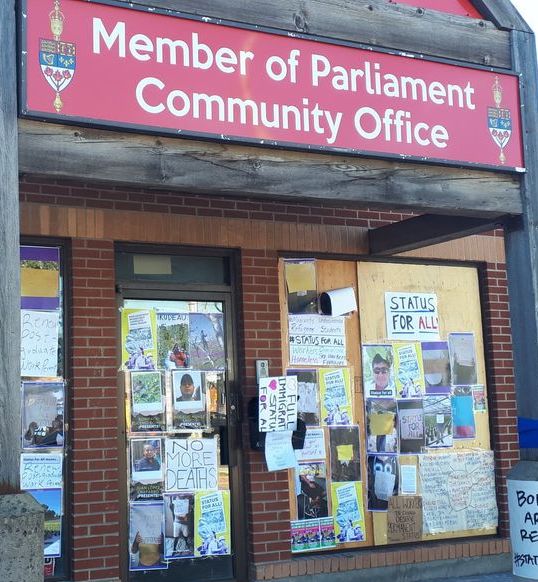
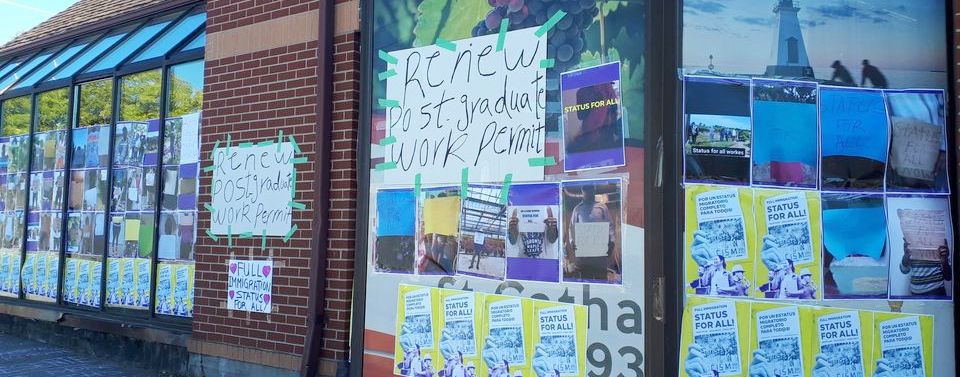
Hamilton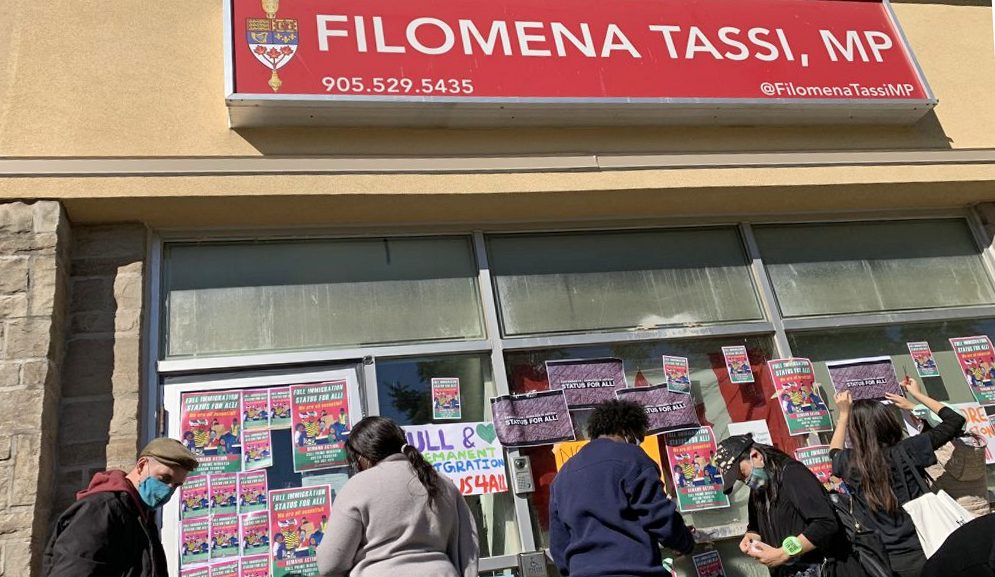
Participants in Hamilton reiterate their demand for "a single-tier
immigration system, where everyone in the country has the same rights.
All migrants, refugees and undocumented people in the country must be
regularized and given full immigration status now without exception. All
migrants arriving in the future must do so with full and permanent
immigration status."
Toronto

 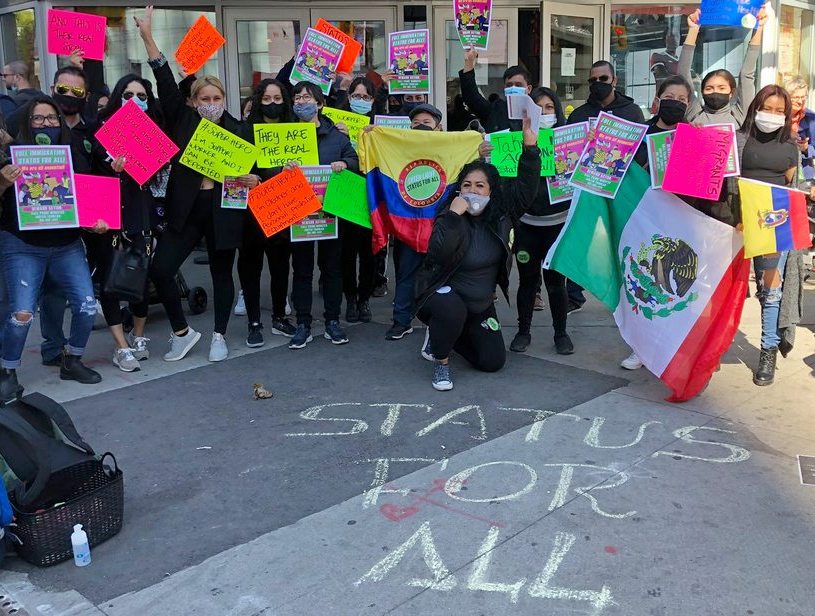
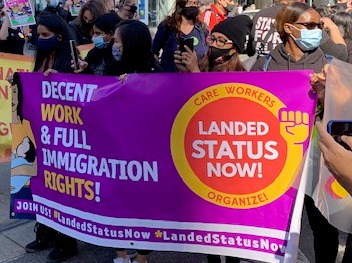 
At the rally at Dundas Square in downtown Toronto, international
students, migrant workers and refugees affirm that, "Status for all
means that we will not be separated from our families and that we can
have basic human rights. COVID-19 has worsened existing inequalities for
migrants, refugees, undocumented people, workers, and students. We have
been shut out of emergency income support, health care, and social
services, while at the same time are forced to keep working. Status for
all allows us to protect ourselves from victimization and discrimination
from our bosses. Without status, as migrants, we are exposed and
vulnerable, afraid to speak up. We want green light status for all."
Montreal

 
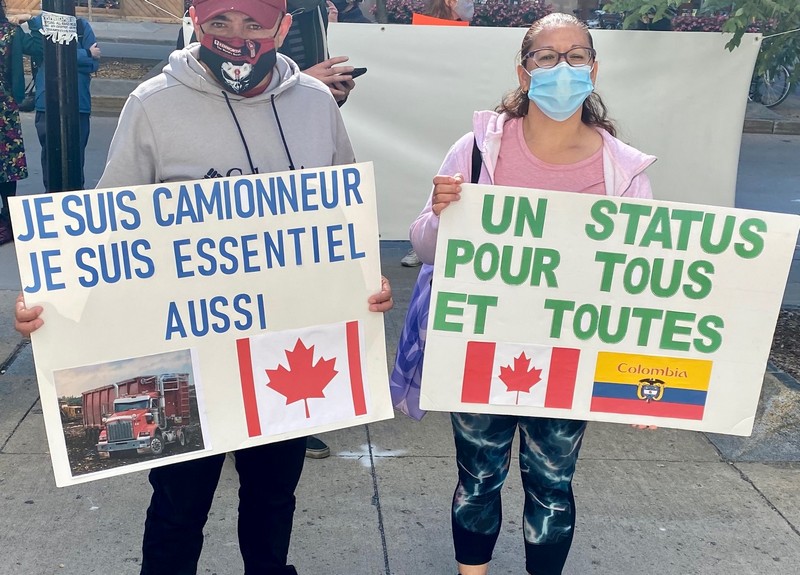 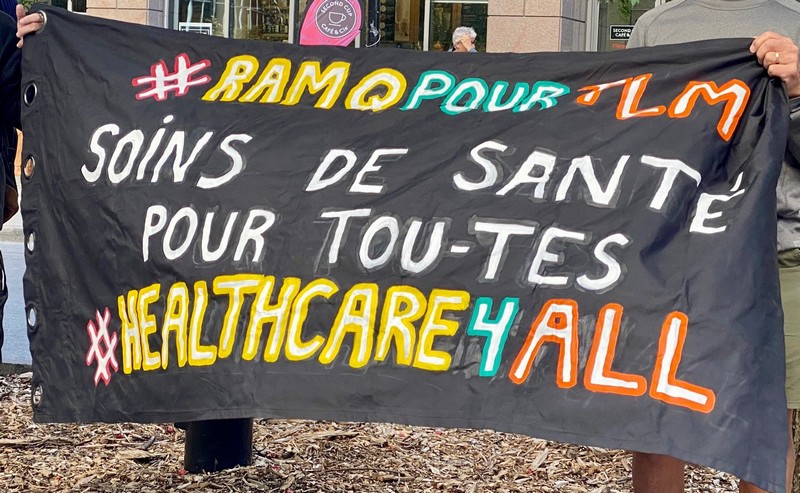
Protestors in Montreal rally outside the constituency office of Premier
François Legault, to hold the Quebec government to account for its
refusal to provide frontline and essential workers with status during
the worst of the pandemic. They also pay tribute to friends and
colleagues who contracted COVID-19 and died.
Halifax
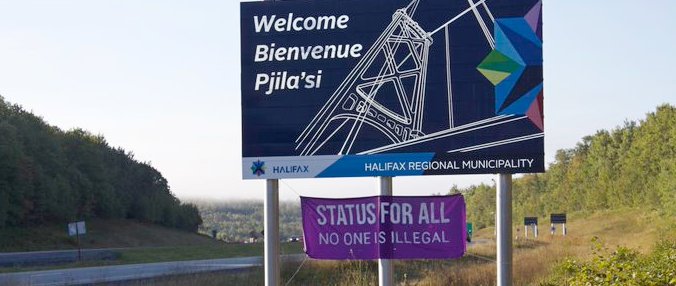

In Action
to Defend Their Rights

Hospitality workers hold 22-day demonstration at the BC Legislature, August 2020.
Hospitality
workers in BC and throughout the country have been
severely affected by the shutdowns related to the pandemic. They have
justly made the claim that government should take measures under the
emergency powers that have been invoked to force employers to grant
recall rights to laid off employees regardless of the length
of their layoff due to COVID-19 shutdowns. 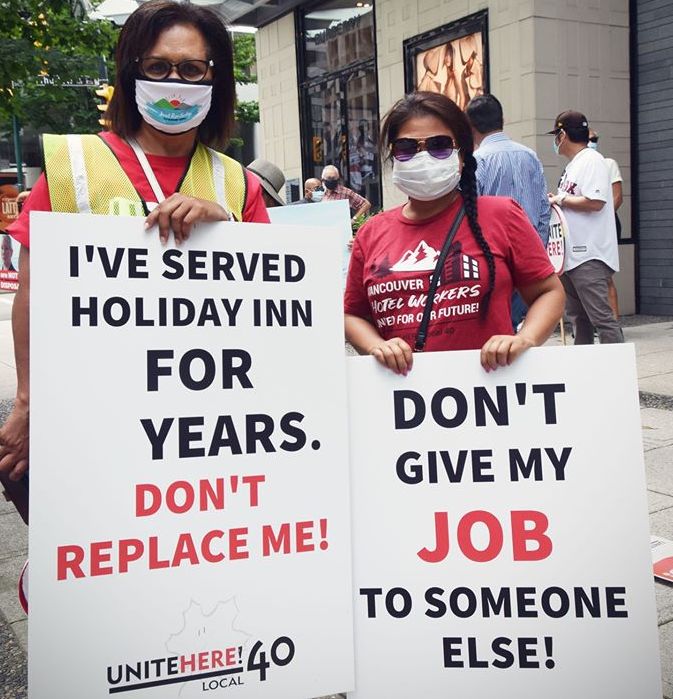 After a
22-day demonstration at the BC legislature and continuous
pickets and rallies at the offices of MLAs, members of UNITE HERE
Local 40 stopped their actions on September 1 after the announcement by
Labour Minister Harry Bains that his government's recovery package
would contain "a pledge for employers to offer a right
of first refusal to existing employees when work resumes," i.e. an
option for employers to "do the right thing." On its part, the NDP
government has systematically refused to take up its social
responsibility to protect jobs through guaranteeing recall rights. After a
22-day demonstration at the BC legislature and continuous
pickets and rallies at the offices of MLAs, members of UNITE HERE
Local 40 stopped their actions on September 1 after the announcement by
Labour Minister Harry Bains that his government's recovery package
would contain "a pledge for employers to offer a right
of first refusal to existing employees when work resumes," i.e. an
option for employers to "do the right thing." On its part, the NDP
government has systematically refused to take up its social
responsibility to protect jobs through guaranteeing recall rights.
On September 17 the BC NDP government released its "recovery
package" entitled "Stronger BC for Everyone: BC's
Economic Recovery Plan." The same day, Zailda Chan, President of UNITE
HERE Local 40, issued a statement that condemned the plan for offering
nothing of substance to protect the jobs of hospitality workers who
have been
laid off or terminated due to COVID. "The takeway from this plan is
that BC's hospitality workers are on their own," she said. The
statement continues: "While we can support economic
assistance to hospitality employers, this should have been tied to a
legally enforceable guarantee that if a business accepts tax dollars in
any form you will return your laid-off staff when business improves.
"The province could easily support job security for all of
BC's laid-off hospitality workers by granting workers a legal right of
return to their pre-COVID jobs as conditions improve. We have seen
similar measures successfully implemented across the border in San
Francisco, Los Angeles County and elsewhere. It would provide some
certainty
to laid-off workers and, more importantly, would not cost the province
a dime."  On September 18 the government announced
that it had established a Tourism Task Force, a 10-member body which
will focus on "reigniting BC's tourism sector and enhancing its
long-term competitiveness" and provided a $50 million budget with, as
yet, no terms of reference. Nine of the ten members are representative
of the industry
from across the province and the tenth, yet to be named, will be "a
representative from the Labour sector." On September 18 the government announced
that it had established a Tourism Task Force, a 10-member body which
will focus on "reigniting BC's tourism sector and enhancing its
long-term competitiveness" and provided a $50 million budget with, as
yet, no terms of reference. Nine of the ten members are representative
of the industry
from across the province and the tenth, yet to be named, will be "a
representative from the Labour sector."
Chan's
statement concludes: "We look forward to learning more about the
Tourism Task Force and how the province plans to reconnect laid-off
workers to their jobs so that employers do not replace them with new
lower wage workers when conditions improve." The
situation of hospitality workers who are fighting for recognition of
their right to be recalled to their jobs no matter how long they are
laid off related to the COVID-19 pandemic, is a situation that
thousands of workers are facing, particularly those in the service sector. Not only does the government not protect and
guarantee their right to recall to their jobs when businesses reopen or
expand from initial reopenings, it is openly assisting employers to
trample on unionized workers' hard-won wages and working conditions
acceptable to them. For example, many hotel workers who had been
employed on a regular full-time or part-time basis have been forced to
accept casual, on-call, precarious work at reduced wages, without fixed
schedules, benefits and any form of security. Employers are also
imposing lower wages and working conditions on workers hired to replace
laid off workers.
UNITE HERE Local 40 is continuing to fight for the rights of
its members and for the rights of all workers, organized and
unorganized, to dignity and respect, which includes the right to be recalled
to their former positions. 
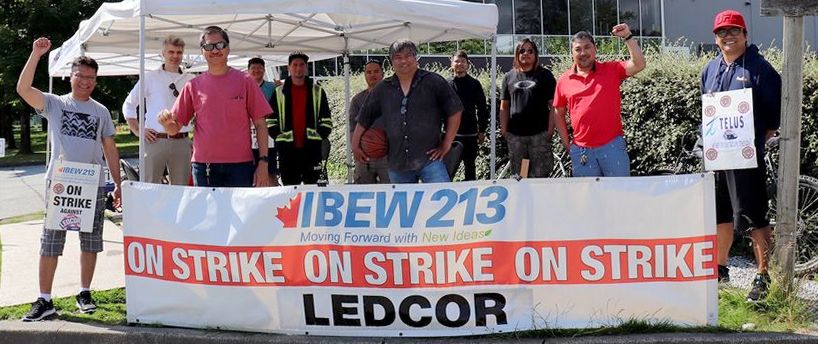
Port Coquitlam
Rally to
Mark One Year on Strike Against Ledcor
September 30 -- 10:30 am - 12:00
noon
1435 Broadway Street International
Brotherhood
of Electrical Workers' Local 213, which represents the workers on
strike against Ledcor
Technical Services (LTS) announced on September 16: "September
30th will mark a full year that we have been 'On Strike'
against LTS. Members
have remained strong on the lines, both at the downtown offices and
across the street from
our very Local, in the fight for a first agreement with this employer.
Federal Labour code has
given LTS time and leeway to extend this labour dispute, while they use
SCABS to keep their
business operating. The use of replacement workers must cease! Federal
Labour Board
hearings are scheduled for October. Please take some time to support
and stand strong with
these members as we approach this important time. The New Westminster
and District Labour
Council has assisted in organizing this COVID friendly drive for
dignity. If you can make it
by for a loop or two in your vehicle to wave and honk in solidarity, it
will help immensely to
demonstrate the spirit of our community and unionism to these workers,
as they roll through
365 days of fighting for better working conditions and the dignity they
deserve." The Ledcor workers in Port Coquitlam went on strike on September 30, 2019. The strike was
provoked by the mass
firing of 31 workers following a union meeting where members took a
strike vote to put
pressure on the company to get serious about negotiating. The workers
are seeking a first
contract which provides for job security and acceptable wages and
working conditions. The
union was certified as the bargaining agent for the workers more than
two years ago and the
strike vote was taken after months without progress in bargaining with
LTS. For
one year the workers have been picketing
daily outside the LTS
production facility as
well as picketing the Ledcor head office in downtown Vancouver and
sending flying pickets
to sites where LTS scabs are working. They have been supported
throughout by the
community and other unions including the United Steelworkers, BC
Building Trades, the New Westminster and District Labour Council, and
others. 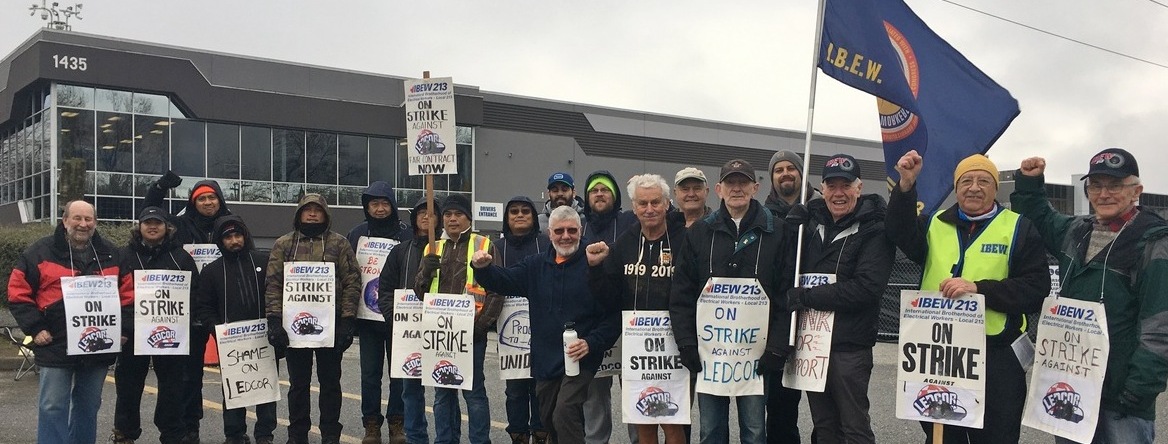
Picket at Ledcor,
December 10, 2019.
The workers' main work is the
installation of fibre-optic cable. LTS
contracts with Telus and
other major communications companies to do this work. The LTS
technicians are paid on a
piece work basis which puts pressure on them to speed up, putting
themselves and the public
in danger. Telus also employs its own technicians who work on the
fibre-optic network, who are paid hourly rates and have better working conditions than the Ledcor
technicians. The Telus
workers, members of USW Local 1944, have supported the striking Ledcor
workers and all
the workers know that the lowering of standards, wages and working
conditions is an
incentive for the monopolies like Telus to contract out more and more
work in a "race-to-the-bottom." The telecommunications monopolies would like
nothing better than to
eliminate the permanent workforce and turn all technicians into
individual "independent
contractors" who would have no protection under the Canada
Labour
Code (federal)
or the Employment Standards Act (BC). The
union has asked the Canada Labour Board to intervene and settle the
terms and
conditions of a first collective agreement as specified in section 80
(1)-(4) of the Canada
Labour Code which allows the board to "inquire into the
dispute
and, if the board
considers it advisable, to settle the terms and conditions of the first
collective agreement
between the parties." A hearing before the Board is not scheduled until
October although the
union's request was sent in December 2019. Join the
rally on September 30! Drivers are asked to drive around the
LTS building at 1435
Broadway Street in Port Coquitlam and those who are walking should wear
masks and
practice physical distancing.

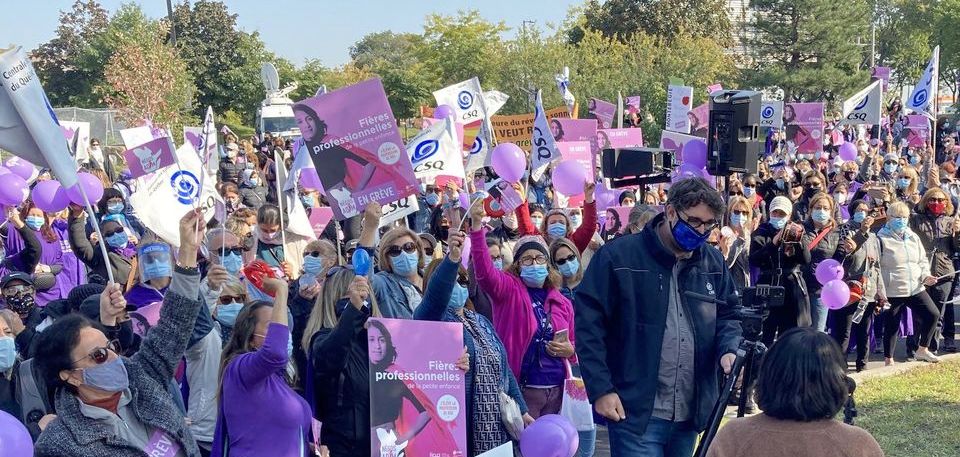
Rally by early childhood home daycare workers on the first day of their general strike, September 21, 2020.
On September 21, facing an impasse in negotiations with the
Quebec government for the renewal of their collective agreement, 10,000
early childhood workers who work in home daycares, members of the
Federation of Early Childhood Workers of Quebec (FIPEQ-CSQ) began a
general strike for their
rights and dignity.  As is the case with so many
workers in health care and social services, these workers are facing
untenable conditions, which is driving many to leave the
profession. One of the main problems is that home daycare workers are
considered self-employed and therefore receive a subsidy per child
instead of an hourly wage which is the case for workers in child care centres. The union
reports that for the average home daycare worker, that subsidy works
out to about $12.42 per hour. The union wants an arbitrator to evaluate
its members' pay scale and wants those wages to increase to $16.75 per
hour, but the government is refusing. As is the case with so many
workers in health care and social services, these workers are facing
untenable conditions, which is driving many to leave the
profession. One of the main problems is that home daycare workers are
considered self-employed and therefore receive a subsidy per child
instead of an hourly wage which is the case for workers in child care centres. The union
reports that for the average home daycare worker, that subsidy works
out to about $12.42 per hour. The union wants an arbitrator to evaluate
its members' pay scale and wants those wages to increase to $16.75 per
hour, but the government is refusing.
Anne Dionne, a Vice-President of the FIPEQ-CSQ, said the poor conditions are
causing a major shortage of daycare workers in the province.
"Professionals are either leaving, closing, or worse -- no new ones are
interested because of the poor conditions. In total 2,500 positions are
vacant across Quebec," she said. To avoid
a general strike, the home daycare workers held rotating strikes for
several weeks and organized demonstrations, including one in front of
the Quebec National Assembly, to press their demands. The refusal of
the Quebec government to settle the negotiations by entrusting the
assessment of the pay scale calculation to an
independent third party left them no choice but to go on strike, they
said. 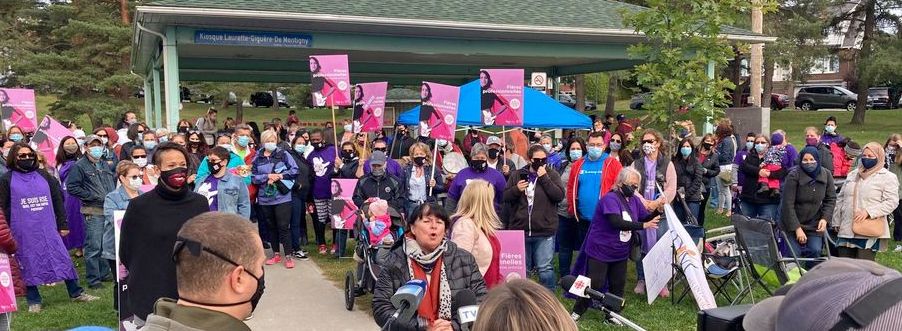
September 16, 2020 action by early childhood home daycare workers in Sherbrooke to press their
demands.
The union clarified that the demand that home
daycare providers earn the equivalent of $16.75/hour instead of the
current $12.42/hour is based on the hourly wage for a non-trained,
level 1 educator in a childcare centre. In
a September 20 press release Valérie Grenon, President of the
FIPEQ-CSQ said that home daycare workers "are true early childhood
professionals,"
pointing out that "They are at the same time an educator, food manager,
bookkeeper,
janitor, and so on." Grenon underlined this point by citing a
Léger survey commissioned by the union to point out that
family childcare
providers who are members of the FIPEQ-CSQ have an average of 16 years
of experience. As part of the current negotiations,
FIPEQ-CSQ proposed that the Ministry of Families consider the
non-trained educator at level 1 as a comparable job to home daycare workers, provided that a
family childcare provider job evaluation committee is set up to make
recommendations on the actual tasks and jobs to be compared. "This
was already a major concession for our organization," states the
president of the FIPEQ-CSQ in the press release. "All that remains to
be settled is the calculation, but the Ministry of Families refuses to
table its way of calculating." Since the beginning
of the negotiations, the Quebec Minister of Families has been very
arrogant in responding to the demand of the home daycare workers for
recognition of their profession and improvement of their conditions.
Speaking on a radio program, Minister Mathieu Lacombe said that
providing early childhood care at home is a way
of life that the workers have chosen, and that they know what to expect
in terms of working conditions and wages. "It's not cheap labour, it's a
choice. It's a choice made by self-employed women who make that choice
knowing how much they're going to get." He repeated the same thing at
the National Assembly on September 22, adding that the
demands of the strikers are unreasonable and beyond Quebeckers' ability
to pay. The striking home daycare workers have
persisted in their just struggle and say that their fight is part of
the overall movement to improve the working conditions of women workers
everywhere. "The message we are sending to the
government today is clear: women are saying 'no' to a degrading wage
below the minimum wage. We are not second-class workers. And more than
just their income, family education providers are on the front lines
for families and demanding better services for the future of their
children," says
the FIPEQ-CSQ in a press statement dated September 21. "These women are the
first link in our education system; they are striking not for
themselves, but to save the system and meet the needs of families. The
situation is critical." The strike of the 10,000
home daycare workers clearly points to the fact that the shortage of
thousands of home child care providers for already licensed spaces will
not be resolved without first improving the working conditions of home
daycare workers. 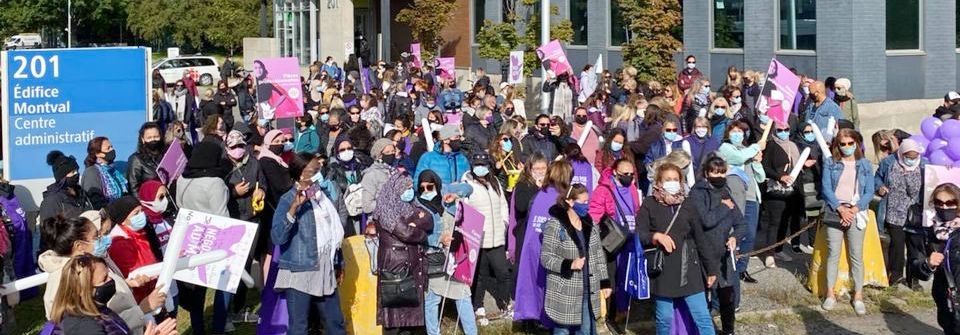
Montérégie, September 18, 2020

Longueuil, September 18, 2020

Saint Thérèse, September 18, 2020
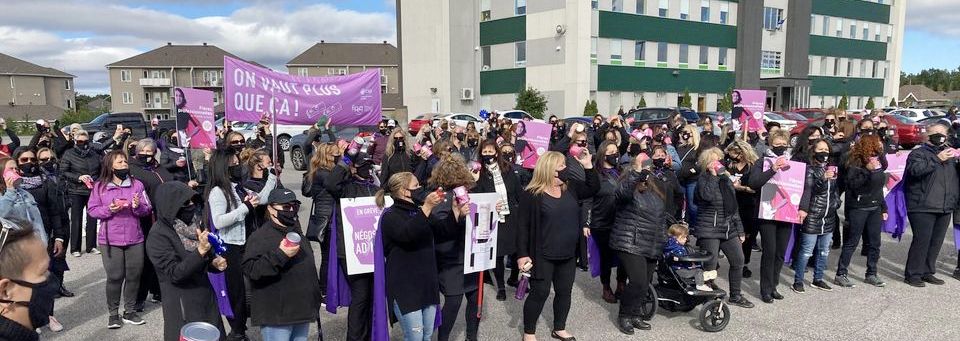
Trois-Rivières, September 17, 2020

(To access articles individually
click on the black headline.)
PDF
PREVIOUS
ISSUES | HOME
Website:
www.cpcml.ca
Email: office@cpcml.ca | 


 These actions,
along with an open letter issued by the Migrant Rights Network and
supported by more than 300 organizations, came just ahead of the
reconvening of Parliament on September 23.
These actions,
along with an open letter issued by the Migrant Rights Network and
supported by more than 300 organizations, came just ahead of the
reconvening of Parliament on September 23. 
 This Wednesday [September 23],
the Trudeau government will announce its priorities and its plan for
the new session of Parliament. Opposition parties will have to decide
where they stand and who they are willing to fight for. We have no time
to lose. We need you to help us get louder!
This Wednesday [September 23],
the Trudeau government will announce its priorities and its plan for
the new session of Parliament. Opposition parties will have to decide
where they stand and who they are willing to fight for. We have no time
to lose. We need you to help us get louder! Vancouver, September 18, 2020
Vancouver, September 18, 2020


















 After a
22-day demonstration at the BC legislature and continuous
pickets and rallies at the offices of MLAs, members of UNITE HERE
Local 40 stopped their actions on September 1 after the announcement by
Labour Minister Harry Bains that his government's recovery package
would contain "a pledge for employers to offer a right
of first refusal to existing employees when work resumes," i.e. an
option for employers to "do the right thing." On its part, the NDP
government has systematically refused to take up its social
responsibility to protect jobs through guaranteeing recall rights.
After a
22-day demonstration at the BC legislature and continuous
pickets and rallies at the offices of MLAs, members of UNITE HERE
Local 40 stopped their actions on September 1 after the announcement by
Labour Minister Harry Bains that his government's recovery package
would contain "a pledge for employers to offer a right
of first refusal to existing employees when work resumes," i.e. an
option for employers to "do the right thing." On its part, the NDP
government has systematically refused to take up its social
responsibility to protect jobs through guaranteeing recall rights. On September 18 the government announced
that it had established a Tourism Task Force, a 10-member body which
will focus on "reigniting BC's tourism sector and enhancing its
long-term competitiveness" and provided a $50 million budget with, as
yet, no terms of reference. Nine of the ten members are representative
of the industry
from across the province and the tenth, yet to be named, will be "a
representative from the Labour sector."
On September 18 the government announced
that it had established a Tourism Task Force, a 10-member body which
will focus on "reigniting BC's tourism sector and enhancing its
long-term competitiveness" and provided a $50 million budget with, as
yet, no terms of reference. Nine of the ten members are representative
of the industry
from across the province and the tenth, yet to be named, will be "a
representative from the Labour sector."

 As is the case with so many
workers in health care and social services, these workers are facing
untenable conditions, which is driving many to leave the
profession. One of the main problems is that home daycare workers are
considered self-employed and therefore receive a subsidy per child
instead of an hourly wage which is the case for workers in child care centres. The union
reports that for the average home daycare worker, that subsidy works
out to about $12.42 per hour. The union wants an arbitrator to evaluate
its members' pay scale and wants those wages to increase to $16.75 per
hour, but the government is refusing.
As is the case with so many
workers in health care and social services, these workers are facing
untenable conditions, which is driving many to leave the
profession. One of the main problems is that home daycare workers are
considered self-employed and therefore receive a subsidy per child
instead of an hourly wage which is the case for workers in child care centres. The union
reports that for the average home daycare worker, that subsidy works
out to about $12.42 per hour. The union wants an arbitrator to evaluate
its members' pay scale and wants those wages to increase to $16.75 per
hour, but the government is refusing.



